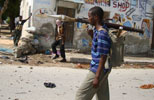
Reporting from Mogadishu for the Los Angeles Times, Edmund Sanders offers a glimpse into the seemingly insurmountable challenges facing African Union peacekeepers charged with attempting to protect Somalia’s lawless and violent capital city. Through interviews with the Burundian and Ugandan soldiers that make up the force, known as AMISOM, as well as with residents in Mogadishu, Sanders exposes just how difficult it is to attempt peacekeeping in a country that, as one commander notes, has no peace to keep. A recent spate of deaths due to malnutrition and chronic funding problems (the force has never received the $800 million dollars it had been promised) underlines the severity of the day-to-day hardships the members of the force encounter.
Sanders highlights the possibility of a new tack with the arrival of Ugandan Maj. Gen. Nathan Mugisha, AMISOM’s new force commander. Mugisha has signaled a willingness, and the go-ahead, to get the force off of its heels and on the offensive. Mugisha believes that his men “can preempt…We don’t have to be like sitting ducks, waiting to be beaten like a drum," a point with which Somali President Sheik Sharif Ahmed agrees.
Military personnel told Sanders that new marching orders would make them much more effective against rebels, which the AU outguns but cannot beat back with its current mandate. However, such an approach sparks fears that preventive action could make AMISOM seem like an invading force, thus galvanizing support for the Islamist rebel groups al Shabaab and Hizbul Islam.
If Sander’s sources are correct, a re-imagined AMISOM could prove more successful. However, the question remains: What does that mean without a political process to pull Somalia out of more than two decades of anarchy?
Photo: Militants patrol the streets in Mogadishu (AP/Mohamed Sheikh Nor)

